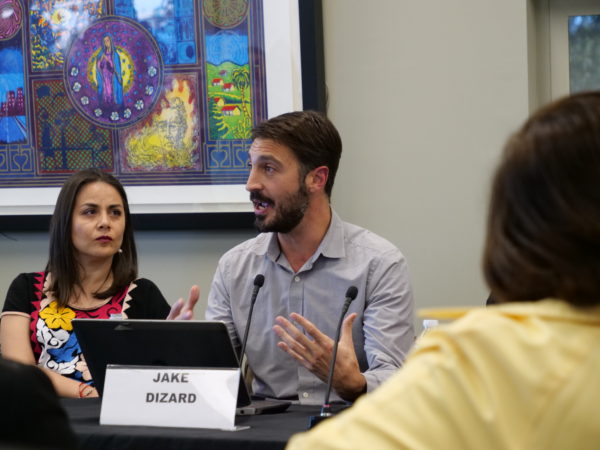(By ANTONIO CUETO)
Mexico entered a new era last December, as President Andres Manuel Lopez Obrador, seen as a beacon of change by the Mexican citizenry that voted for him by a 53 percent majority, took office.
A panel comprised of activist scholars expert on Mexican politics and society met at the University of Texas at Austin Feb. 12 to discuss the human rights and governance challenges the new president and government face as the country begins a new chapter in history.

Corruption, violence and crime were among the issues discussed by the panelists.
The panel was put together by the university’s Mexico Center at Teresa Lozano Long Institute of Latin American Studies (LLILAS), as part of its second installment of the “Puentes Series,” an annual event in which experts from different fields meet to discuss topics related to the present situation in Mexico.
Chief research officer for the World Justice Project, Alejandro Ponce, opened up the discussion by sharing data he and his team of researchers gathered in Mexico by interviewing more than 25,000 citizens and attorneys from all 32 Mexican states to see how they understand corruption.
The data was used for the WJP Rule Of Law Index, an international tool used to quantify how justice is perceived in a country according to its inhabitants. The team’s research in Mexico identified three key challenges: corruption, security, and criminal justice.
Ponce’s remarks were followed by Jake Dizard, postdoctoral fellow for the Mexico
Security Initiative at the Robert S. Strauss Center for International Security and Law. He talked about the new branch of the Mexican military: the National Guard.
“The most visceral manifestation of insecurity is violence,” Dizard told an audience of almost 100. “It is understandable that AMLO (president of Mexico) feels urgency to do something.”
Because police have been “fundamentally ineffective,” along with their corrupted
perception among Mexican citizens, the government established the National Guard to replace the existing system. It’s a decision heavily criticized by humanitarian organizations, including the U.N.
Dizard raised doubts about the legitimacy of using militarized forces to police the
country. He explained that this gives significant public control to the military, and used other countries as examples where decisions like this led to many human rights abuses by military without accountability.
“It is a dicey bet to leave it up to the military,” Dizard said.
Janice Gallagher, global urban studies assistant professor at Rutgers University, followed Dizard by talking about the ongoing struggle with disappearances in Mexico. She pointed out the lack of a national protocol that deals with missing people.
Last year alone 1,100 mass graves were found in different parts of the country. According to Gallagher, the government currently has in its hands 37,000 corpses, yet somehow there is no database that can be used to identify the victims.
“The new government wants disappearances wiped clean,” Gallagher said. “However, because disappearances are an ongoing crime — meaning that there are currently thousands of people whose location is unknown across Mexico — this is not an option.”
Gallagher finished by offering a solution to the issue: opening a national forensic system that would create connections between different levels of government and non-governmental organizations, in order to create a database that can be accessed to look for the people who disappeared. She also pointed out that the new government has allocated $400,000 toward an initiative that will deal with disappearances.
“Mexican authorities have been incredibly inconsistent and unreliable,” Gallagher said. “Hopefully we will see a change with the new government by being accountable to their promises.”




